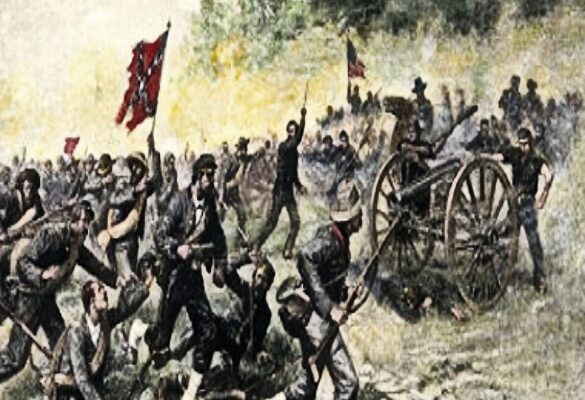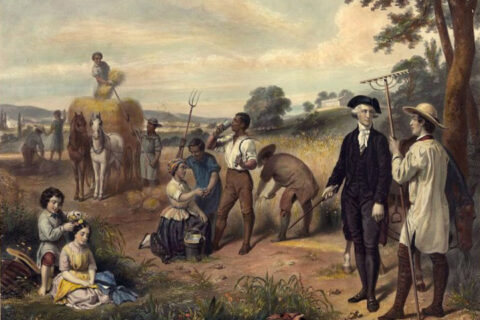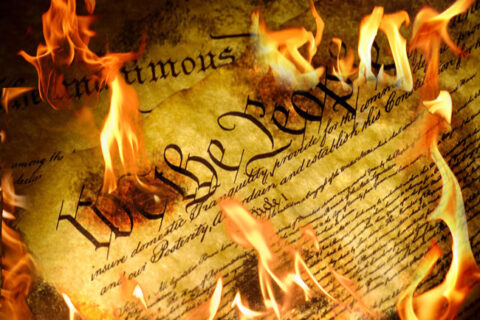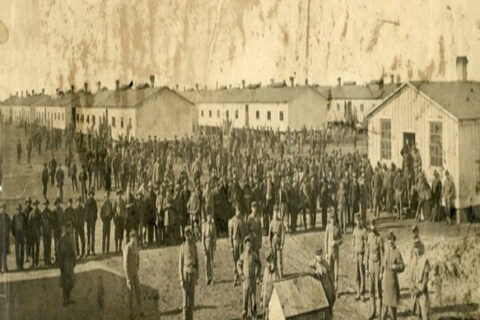In his lecture series on the Civil War, renowned historian Gary Gallagher explained that the South in 1863 did not perceive the Battle of Gettysburg as a defeat but rather as a draw. Even though it ultimately fell short of its primary objective, to achieve a significant victory over the Army of the Potomac and thus bring about peace talks, many Southern leaders saw the campaign as a success because it pulled the Federals out of Virginia, providing its war-ravaged farmlands much-needed rest, and maneuvered the war to the North where Confederates lived off of Northern farms and supplies. Famed cavalry General “Jeb” Stuart wrote his wife, “Gen Lee maneuvering the Yankees out of Virginia is the grandest piece of strategy ever heard of.”
As for the battle itself, Gallagher mentioned how the South was not driven from the field; they simply failed to remove the Federals from their positions on Day 3. Since they made an orderly retreat rather than being driven from the battlefield, the engagement was viewed by most at the time as a draw. Some Southern soldiers (and the populace, newspapers, etc.) viewed it as a victory since they won day 1, driving the Federals back, and maintained their positions on days 2 and 3. In Jeb Stuart: The Last Cavalier, Burke Davis wrote, “There was not a spirit of defeat in the army this morning; men waited hopefully for Federal attack on their hill.”
Gallagher described Day 1 as one of the great attacking victories of the war, with Southern forces successfully pushing back two Federal corps and inflicting heavy losses. On Day 2, the outnumbered South launched an attack against Federals who were entrenched on high ground, managing to cause more damage than they sustained. Federal General George Meade was so bloodied after Day 2 that he considered retreating and made plans to do so, but his subordinates persuaded him to stay. As Confederate General James Longstreet was quoted as saying in the Ken Burns’ documentary The Civil War, “When the second day’s battle was over General Lee declared it a success.”
By the end of the three-day bloodbath, the Federals had suffered such enormous casualties (the largest of any battle of the war) that they did not mount a significant offensive in Virginia for 10 months.
Many see Gettysburg as a major defeat because Lee never invaded the North again. Yet this had more to do with the cumulative loss of manpower to all Southern armies and a drop in morale coupled with larger, more aggressive Northern armies. At the time, nobody knew Lee would not invade again, and some thought he would. General Jeb Stuart wrote his wife on July 13th, “We return without defeat to recuperate and reinforce when no doubt the role will be reenacted.”
Further, Confederate General Jubal Early invaded the North in ‘64, at one point threatening Washington D.C., and Lee sent Longstreet and two divisions to Tennessee after Gettysburg, enabling Braxton Bragg to take the offensive there and win the Battle of Chickamauga. If Lee had just suffered a significant defeat or thought himself in danger, why would he send his top corps with two veteran divisions to the Western Theater? Why not consolidate defensively? Instead, he was still thinking offensively. And Lee showed the South had plenty of fight left in ‘64.
Others say the South lost the war at Gettysburg; I don’t see how this is so. Gettysburg, combined with Vicksburg, was a big blow to Southern manpower. However, it could also be argued the South was already finished when Stonewall Jackson died. But still, regardless of Jackson and the results of Gettysburg and Vicksburg, Lincoln was not likely to be reelected (Peace Democrats would have triumphed) until General Sherman captured Atlanta and Jubal Early (who was making headlines) was defeated in the Shenandoah Valley. Those events, along with Admiral Farragut’s earlier triumph at Mobile Bay, secured Lincoln’s reelection and won the war for the North, not Gettysburg. The high casualties of 1864 and battles like Gettysburg (Union losses of 23,000) almost cost the Union the war, and the people of the North desired peace, until new Union victories restored popular morale.

Jeb Smith is the author of four books, the most recent being Missing Monarchy: Correcting Misconceptions About The Middle Ages, Medieval Kingship, Democracy, And Liberty. Before that, he published The Road Goes Ever On and On: A New Perspective on J. R. R. Tolkien and Middle-earth and also authored Defending Dixie’s Land: What Every American Should Know About The South And The Civil War, written under the name Isaac C. Bishop. Smith has authored dozens of articles in various publications, including History is Now Magazine, The Postil Magazine, Medieval History, Medieval Magazine, and Fellowship & Fairydust and featured on various podcasts including The Lepanto Institute.






You’ve put a convincing positive spin on Gettysburg, but it’s counterbalanced by accounts such as Johnston Imboden’s ‘The Retreat from Gettysburg’ and the retrospective comments of Lee and Longstreet. Gettysburg though, is a fascinating and sad study in ‘what ifs’. My personal opinion is that the war could have been won at First Manassas if they’d pushed on into D.C. as Jackson wanted to do.
Agreed, that is the big “what if”
Or, what if Jackson was not killed. I cover that in a future article.
SO many ‘what ifs’. What if Jackson’s Corps had been given to D.H. Hill. No disrespect to Ewell, but Culp’s Hill almost certainly would have been taken on the first day by Lee’s ‘fightingest’ General. Evander Law said that fifteen minutes might have made the difference on day 2 in taking Little Round Top. It’s even been written that A.P. Hill’s artillery could have been placed and utilized much more effectively on day 3 for the assault. Lee himself said it best after the battle: “Too bad, too bad … Oh too bad!”
If Gettysburg is not a Southern defeat, then Afghanistan and Vietnam are not American defeats.
I do not think they are equal. Neither Afghanistan nor Vietnam were on American soil and removed as were the Yankees. Further the gathering of supplies was what the South needed. And unlike those you mention, the South were not driven from the field.
I’m afraid I don’t care as much about such things as I used to, since they declared an end to Reconciliation, but I don’t think Vietnam was a military defeat. It was an asymmetrical war but the U.S. obliterated the Communists; they wiped out the Viet Cong and drove the North Vietnamese Army out of South Vietnam. The U.S. owned the field but failed to give the South military support, as promised in the Paris Peace Accords, in subsequently holding out the Communists. The war also stopped cold the spread of Communism in SE Asia and severely damaged the U.S.S.R., which may have been the purpose, all along. It’s certainly treated as a political disaster.
I used to say “we” instead of “the U.S.”
The battle was strategic loss for the South, but a tactical stalemate in which the South gave better than it got against a significantly larger force.
If Lee made it into the North he should have burned it all down, like Sherman did to the South. That was the mistake, trying to fight the war all PC.
I am of the same thinking jun.To see them all burn would have been so beautiful.Great comment.Merry Christmas.
The South lost largely because of the Siege of Vicksburg and really the overall poor handling of the western theater.
Quite true Joe.Have a good Christmas.God bless you.
Whether Gettysburg was a “major defeat” or not is debatable but the Army of Northern Virginia certainly gained nothing from the invasion and battle. I’m inclined to think it was more another battle of attrition with the casualties unable to be replaced. It wasn’t the first nor last.
My view is the South lost when the states seceded without any idea the resolve of Lincoln and the war Party of the North. Even the citizenry of the North were unaware of that resolve.
The red letter moment, albeit an unrecognized moment, was when President Davis decided General Lee would be a clerk and engineer for the first year. U.S. Gen. Winfield Scott and Pres. Lincoln knew Lee was the man to lead their army, it’s unfortunate Davis saw his friend, Gen. A.S. Johnston and himself as Commanders of the Confederate effort. It’s fair to criticize Lee in the event but he displayed great ability in his first campaign, The Seven Days, within one month to organize and plan to defeat the enemy. It’s impossible to know but with two months to prepare and focused Command objective, instead of the jealousy and inertia among Johnston, Beauregard and Davis at First Manassas, it’s reasonable to think Lee’s army would’ve done what they always did, fight until they could fight no more. The rabble between them and Washington was nothing like McClellan’s army a year later in front of Richmond.
Well , they did gain supplies and inflict heavy losses on the enemy, but perhaps they lost more than they gained!
Thank you. I neglected that and would have edited later if it was possible. Yes, fed themselves, collected foodstuffs and livestock, captured horses and clobbered the heck out of the Yankees.
Also what they didn’t do – mostly. No wanton decimation of the countryside. Lee’s boys didn’t burn barns, houses and crops. They just took what they needed.
Nice articles, Mr. Smith.
Thank you sir!
Once I believed the Truth about the The South’s warrior spirit concerning the civil war. in True reality it is still a Revolutionary war!
Win!
God Bless Dixie !
Excellent piece Jeb Smith and I can’t disagree with your thinking.Look forward to more of your intelligent viewpoints.God gave you a brain and you are surely using it.Merry Christmas and may the Lord bless you and your family.
Thank you Rebel Roy for the nice comments, the same back to you and yours.